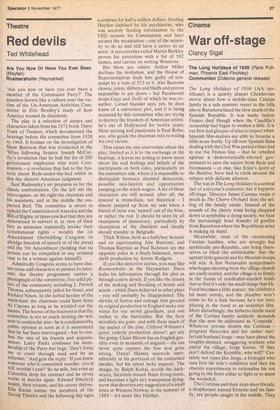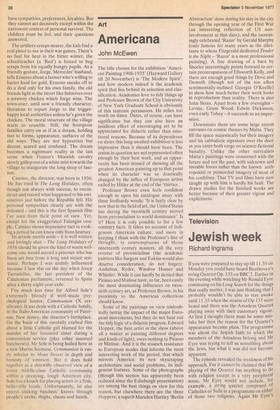Cinema Clancy Sigel
The Long Holidays of 1936 (Paris Pullman, Phoenix East Finchley) Communion (Odeons general release) The Long Holidays of 1936 (AA certificate) is a quietly almost Chekhovian movie about how a middle-class Catalan family in a safe summer resort in the hills above Barcelona faced the slow death of the Spanish Republic. It was made before Franco died though when the Caudillo's censorship had begun to weaken a little. It is our first real glimpse of what to expect when Spanish film-makers are able to breathe a little more freely. Up till now Spanish films dealing with the Civil War period either had to toe the Franco line — that he rebelled against a democratically-elected government to save the nation from Reds and freemasons — or else, like Erice's Spirit of the Beehive, have had to circle around the subject with delicate allusion.
The war in The Long Holidays is a central fact of everyone's existence, but it happens off-stage, Director Jaime Camino treats it much as The Cherry Orchard does the selling of the family estate. Instead of the sounds of the cherry trees being chopped down to symbolise a dying society, we hear the increasingly loud thunder of gunfire from Barcelona where the Republican army is making its stand.
Meanwhile, none of the vacationing Catalan families, who are strongly but apolitically pro-Republic, can bring themselves to think the unthinkable: that the upstart little general and his Moorish troops will win. A few Nationalist sympathisers who began shooting from the village church are easily routed, and the village is so firmly in the hands of syndicalist-minded locals that at first it's only the small things that irk. Food becomes a little scarcer; the children a bit more unruly, and the plumber won't come to fix a leak because he's too busy playing in the band at an anarchist fête. More disturbingly, the hitherto docile maid of the Cortina family suddenly demands that she now be addressed as 'Comrade'. Whatever private doubts the Cortinas — pregnant Mercedes and her rather ineffectual husband Jorge — may have about the roughly-dressed, swaggering workers who patrol the village, Jorge knows. 'If they don't defend the Republic, who will?' Certainly not types like Jorge, a biologist who uses first his wife's condition and then his obscure experiments to rationalise his not going to the front either to fight or to assist the wounded.
The Cortinas and their next-door friends, a shopkeeper named Ernesto and his family, are people caught in the middle. They have sympathies, preferences, loyalties. But they cannot act decisively except within the narrowest context of personal survival. The children must be fed, and their questions answered.
The artillery creeps nearer, the kids find a real pistol to use in their war games. There's no fuel for heat in the bitter winter, the schoolteacher (a 'Red') is forced to beg scraps from his equally hungry pupils. As a friendly gesture, Jorge, Mercedes' husband, tells Ernesto about a farmer who's willing to barter food for gold, Ernesto sneaks off to do a deal only for his own family, the old friends fight in the street like fishwives over a scrawny chicken which Jorge wins. The town-crier, until now a friendly character, threatens to report Jorge to the triggerhappy local authorities unless he's given the chicken. The moral structure of the village starts to crumble. Still, the bourgeois families carry on as if in a dream, holding fast to forms, appearance, surfaces of the old ways. They are not hypocrites but decent, scared and confused. The dream becomes a nightmare reality in the last scene when Franco's Moorish cavalry slowly gallop out of a white mist towards the village to inaugurate the long sleep of fascism: Camino, the director, was born in 1936. He has tried in The Long Holidays, often though not always with success, to recon,struct and recordwhat happened to his owr relatives just before the Republic fell. His personal sympathies clearly are with the defeated — and this is the first Spanish film I've seen from their point of view. Yet, except for the exaggerated Falangist couple, Camino shows impressive tact in evoking a period he can know only from hearsay. Its artistic merits aside — it is well written and lovingly shot — The Long Holidays of 1936 should be given the kind of warm welcome one would accord a prisoner who has been set free from a long and unjust sentence. Perhaps I was unduly influenced because 1 Saw this on the day when Josep Tarradella.s, the last president of the Catalonian parliament, returned to Spain after a thirty-eight-year exile.
I've much less time for Alfred Sole's extremely bloody if well-made psychological horror, Communion (X certificate) It too deals with a Catholic family, in the I tab-American community of Paterson, New Jersey, the director's birthplace. On the basis of this carefully crafted film about a little Catholic girl blamed for the murder of her favoured sister during a communion service (plus other assorted butcheries), Mr Sole is being hailed here as a new Martin Scorsese. Communion is vastly inferior to Mean Streets in depth and honesty of emotion. But it does hold together as a shrewdly observed view of a lower middle-class Catholic community within a decaying, tough American city. Sole has a knack for placing actors in a firm, believable locale. Unfortunately, he also enjoys sticking butchers' knives through people's necks, thighs, chests and hands.



































 Previous page
Previous page